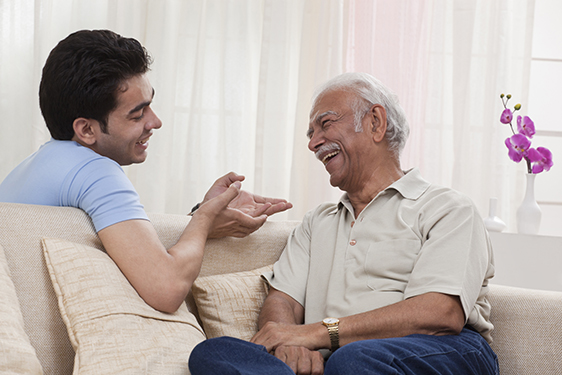Everyone feels down sometimes and could use some help to see the bright side of things. When you visit a loved one in a senior care community, it can be difficult to see him or her in a sad mood. You can bring a smile to just about anyone’s face with these tips:
Visit with a furry friend
Spending time with pets has proven to make people feel happier. If you have a dog or a cat, arrange to have your senior loved one visit with it. The physical act of petting an animal can improve blood pressure and alleviate stress, plus our furry pals provide unconditional love. Nearly everyone experiences a mood boost when a cat rubs against their leg and purrs or a dog lays its head in their lap. This is why some therapy dogs aren’t trained for medical emergencies or to assist people with disabilities – instead they simply provide love and attention to improve the senior’s quality of life.

Tell jokes
Many seniors love sharing one liners. If you have a loved one in memory care, he or she may enjoy some quick jokes. Knock-knocks like the one that ends in, “Orange you glad I didn’t say banana!” are often a hit with people who have dementia and Alzheimer’s because they don’t need much prior knowledge or memory to immediately understand. There are many great joke books out there to try, or simply purchase a bag of taffy or other candies that have jokes on the wrappers. Those aimed at or written by elementary school kids are perfect for sharing with older people in memory care communities.
Here are a few jokes to share:
Q – What do you call an alligator in a vest?
A – An investigator!
Q – What do you get from a pampered cow?
A – Spoiled milk!
Q – What’s the best thing about elevator jokes?
A – They work on so many levels!
Dance together
When you are physically active, your brain releases happiness chemicals that improve your mood. One way to get a senior to start moving is to dance! If the individual is in a healthy enough condition to really move, consider organized dances like the tango or other options you know. Even free-styling or chair dancing (only moving the upper body to the music) can be a little cheerful boost!
Listen to the senior
Sometimes simple tricks aren’t what the older individual needs to feel better. Instead of trying to take his or her mind off whatever is bothering him or her, talk about the issue. Maybe the person is confused about the date, where he or she is or your relationship. Take time to listen and then reply as necessary. If you aren’t able to be there to lend an ear, consider having the senior speak with a friend or perhaps visit a therapist. There are many psychologists trained in specifically working with older people, those going through grief and individuals with memory loss.
If you found an error, highlight it and press Shift + Enter or click here to inform us.



